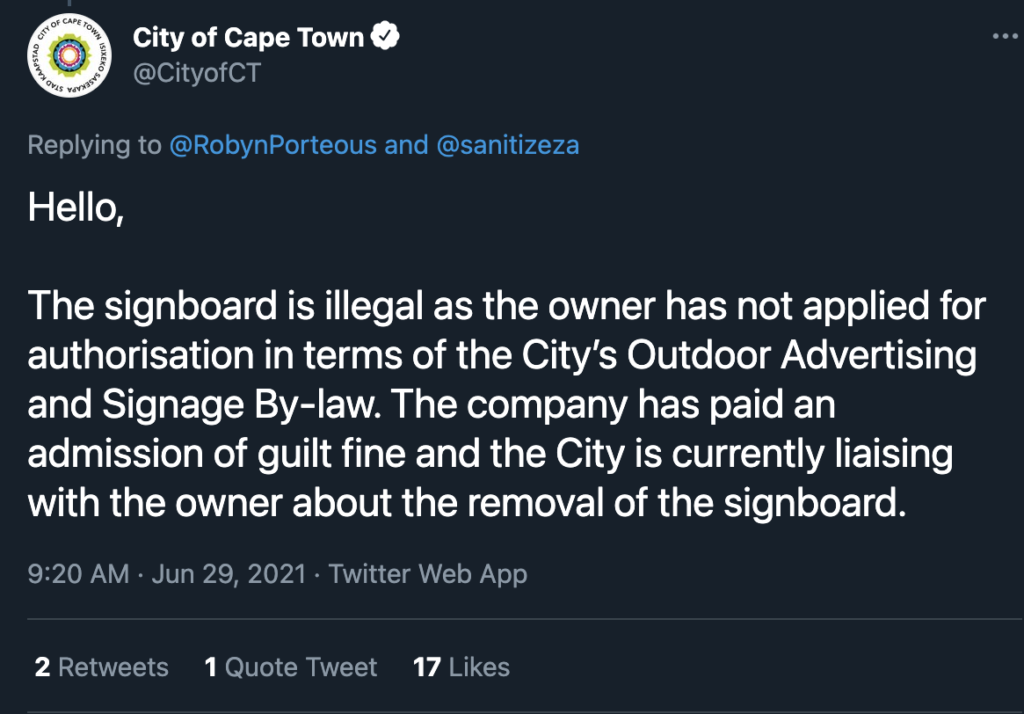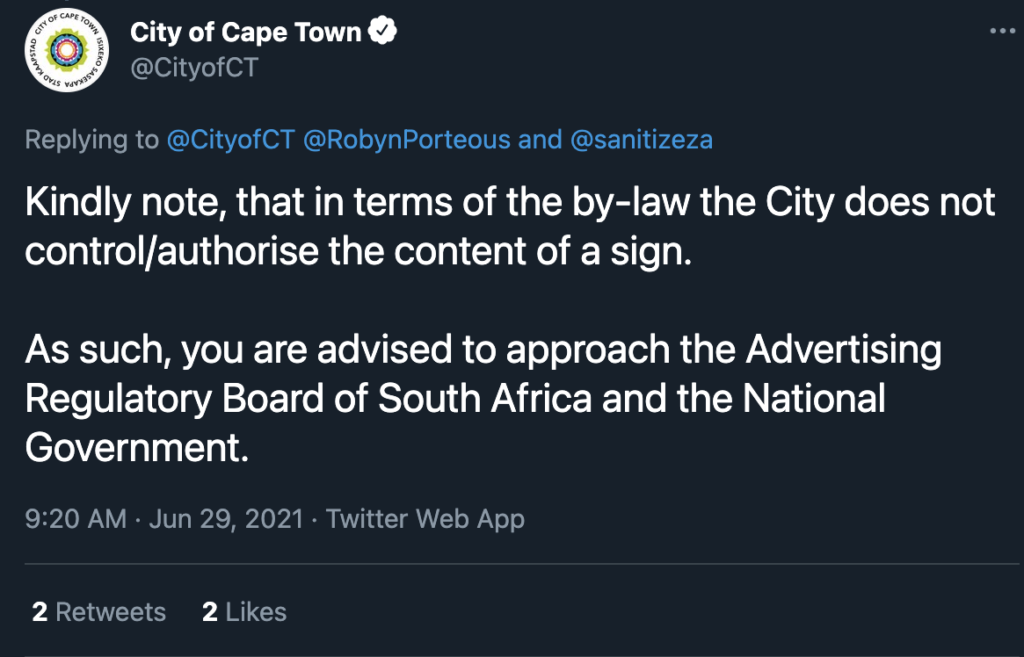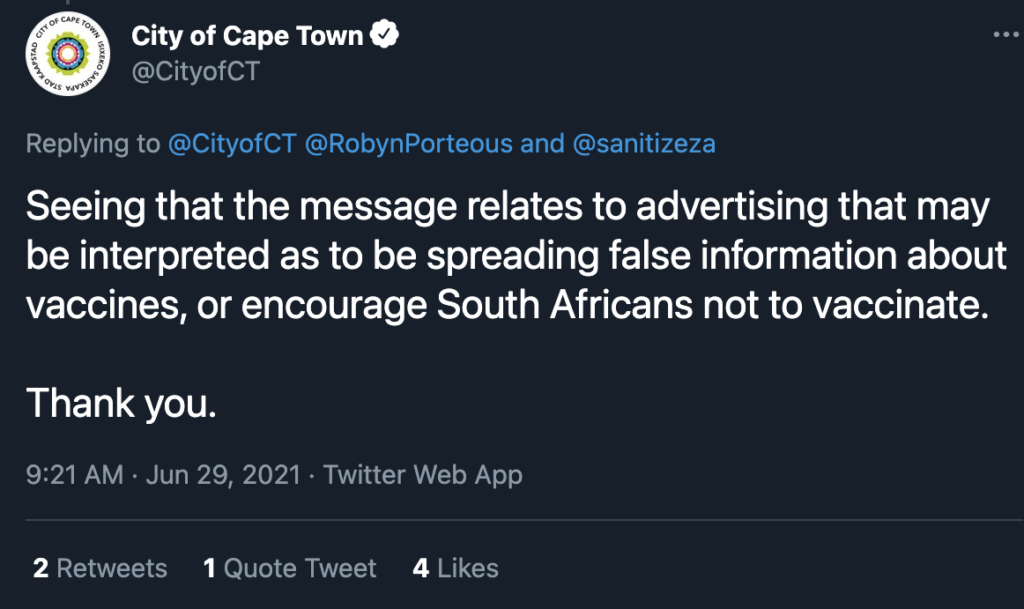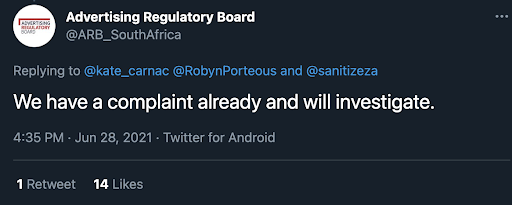(Angel Garcia/Bloomberg via Getty Images)
Cape Town drivers who travel the M5 are no strangers to billboard advertisements. A billboard at the Koeberg interchange displays an advertisement for a company called San-I-Tize, whose tagline is “Keeping you virus-free”.
The business’s website claims to specialise in the “direct importation and distribution of medical and emergency supplies to state and private hospitals, government, and the private sector”.
Such a company, which the site says is a provider of “high-quality, properly certified, reputable and reliable supplies”, should probably be considered a blessing in this time of the coronavirus pandemic. But not when it comes to the billboard in question.
“In Gates you trust?!” it reads. “In God we trust. No ‘vaccine’ for us.”
Having lived in this pandemic for more than a year, it’s likely you’ve encountered a Bill Gates vaccine conspiracy theory or two. Rory Smith, from fact-checkers First Draft News, states: “There are myriad conspiracies surrounding Bill Gates. He is this kind of voodoo doll that all these communities are pricking with their own conspiracies. And it is unsurprising he has become the voodoo doll — because he has always been the face of public health.”
Between February and April last year, theories linking Gates to the coronavirus were mentioned 1.2-million times on television or social media, according to a study by The New York Times and Zignal Labs, a media intelligence software service company.
The voracity of such conspiracies at a time when the Covid-19 virus continues to ravage lives and ruin livelihoods is dangerous because it has real-world consequences. And if you’re in the sanitisation business, the potential for real profit.
San-I-Tize didn’t need to say much on their billboard, nor did they need to state it overtly. The simple mention of Gates (alongside a photograph of his face to erase any doubt as to whom it referred) is all that’s needed to invoke the same sense of uncertainty inspired by vaccine-themed conspiracy theories.
Earlier this year, as a participant in a vaccination trial, I wrote about some of the harm misinformation and disinformation has caused during the pandemic. I wrote about my concerns of the real risk of failing to achieve herd immunity (estimated to take effect when two-thirds of the population have been vaccinated) as a result of misinformation-induced vaccine hesitancy, which now ranks as one of the 10 greatest threats to global health, according to the World Health Organisation.
With some relief, I read the latest Ipsos survey in February, which pointed to a general uptick in Covid-19 vaccine intent the world over, illustrated in South Africa by an increase from 53% in December to 61% at the end of January among survey groups of willingness to receive the vaccine.
But, because our national vaccine roll-out’s launch on 17 May, with the goal to vaccinate 5.5-million people by the end of June, fewer than two million senior citizens have received their first dose. And anecdotally, I don’t think I’m alone in hearing more and more stories of people with vaccination bookings who are not showing up, while others refuse to register.
So, what does this have to do with San-I-Tize and their billboard? It’s just one billboard alongside one road in one city. Except that it isn’t.
I hadn’t heard of San-I-Tize before yesterday. My introduction to it was through a tweet that was reported to Real411, which fights disinformation and for whom I volunteer as a technical reviewer. The tweet, posted by an anonymous and anti-vaccination account, featured a video downloaded from TikTok, which showed the billboard, with words added which read: “South African people starting to wake up”.
Given its presence on at least two social media platforms, it’s easy to understand how its message about opting out of the vaccine in favour of what is inferred to be the protection of God, could breach the limitations of its geographic location.
I ought to clarify that it’s not faith in God I take issue with (although religion does not serve as a substitute for the vaccine). Rather, it’s the appropriation and exploitation of peoples’ faith by a company that seems to want to encourage vaccine hesitancy because ultimately it stands to profit from the continued sales of its “medical and emergency supplies” to “state and private hospitals, government, and the private sector”.
When asked how the billboard was allowed to be erected, the City of Cape Town said it was illegal because the owner had not applied for authorisation.


The city said the billboard had the potential to be interpreted as “spreading false information about vaccines, or encourage[ing] South Africans not to vaccinate”.

The Advertising Regulatory Board said a complaint about the billboard had already been laid and it was in the process of investigating.

One longstanding concern relating to any virus or disease is the potential for Big Pharma to prioritise profit over people. There are examples of the pharmaceutical industry, and even countries, falling short when it comes to putting peoples’ lives first — such as certain nations’ opposition to the TRIPS Waiver and the expiration date on AstraZeneca’s “no profit pledge”) — those who promote anti-vaccine messages while financially benefiting from South Africa’s dependence on hand sanitisers, the KN95 and surgical masks, non-woven disposable coveralls and thermometer guns among other products should surely be tarred with the same brush?
When it comes to the effectiveness of the vaccine in bringing this pandemic under control, we need only to look abroad to see examples of how well mass vaccination efforts are working. In the United Kingdom the arrival of the Delta variant is seeing Covid-19 cases double every 11 days and the majority of infections have been in children and young adults who have not yet been vaccinated.
Experts are confirming that a complete vaccination is especially important with the Delta variant, which is spearheading the third wave we’re seeing locally. In light of this, achieving herd immunity through mass vaccination is all of our responsibility — including ensuring we don’t allow bad actors such as San-I-Tize to take advantage of peoples’ fears and their faith for financial gain.